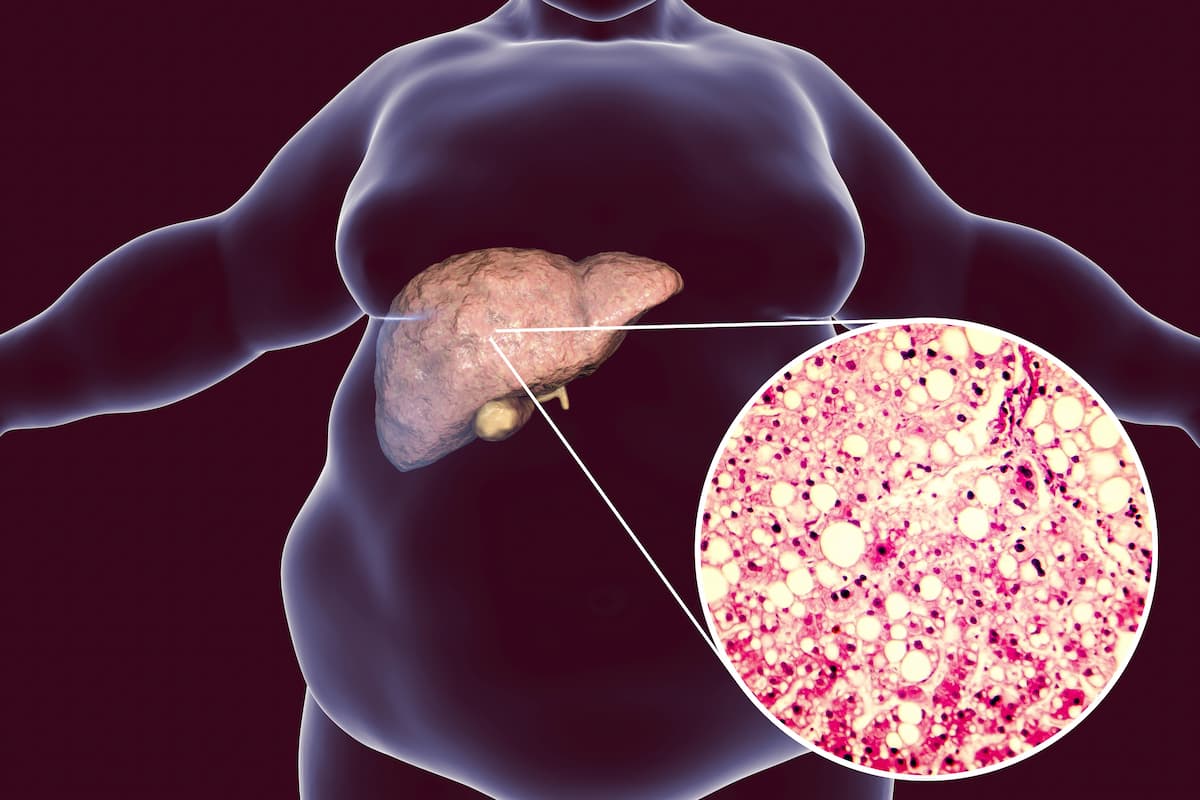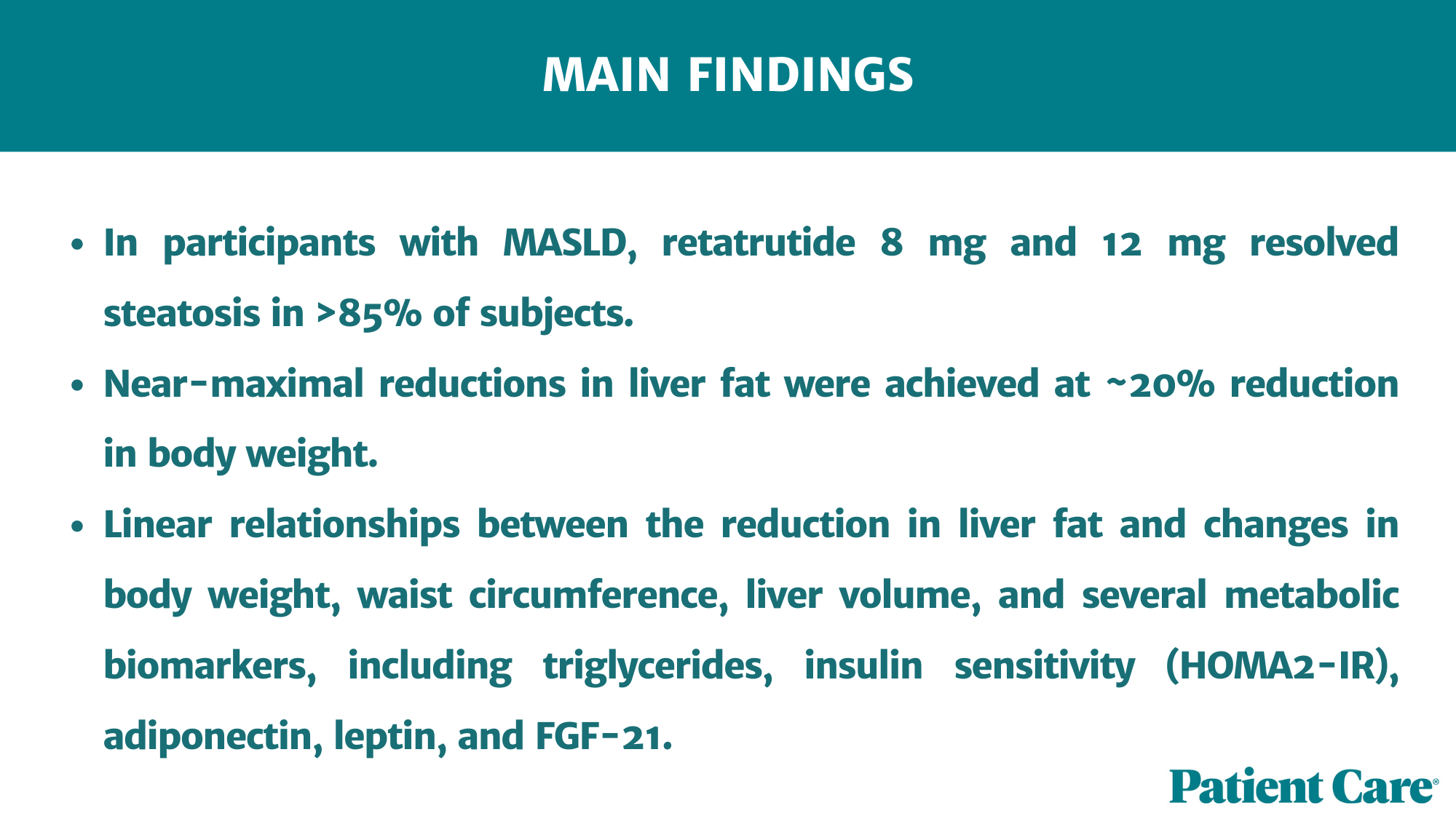STUDY: Novel “Triagonist” Retatrutide Resolved Steatosis in Over 85% of Patients with MASLD and Obesity
TLM 2023: In participants with metabolic dysfunction-associated steatotic liver disease, retatrutide 8 mg and 12 mg resolved steatosis in >85% of subjects.

In patients with metabolic dysfunction-associated steatotic liver disease (MASLD), the novel triple hormone receptor agonist retatrutide (Eli Lilly and Company) resolved steatosis in over 85% of patients, according to new data.
Findings come from a study abstract presented at the American Association for the Study of Liver Diseases’ annual scientific conference, The Liver Meeting 2023, held November 10-14, in Boston, MA.
MASLD, formerly known as nonalcoholic fatty liver disease, is associated with obesity, along with other metabolic comorbidities, and insulin resistance. Given the rising prevalence of obesity, finding effective treatments for MASLD is crucial.
Retatrutide combines a glucagon-like peptide 1 (GLP-1) receptor agonist, a glucose-dependent insulinotropic polypeptide (GIP) receptor agonist, and a glucagon receptor agonist, and is under investigation for the treatment of obesity.
In June 2023, results from a phase 2, double-blind, randomized, placebo-controlled trial presented at the 83rd Scientific Sessions of the American Diabetes Association showed that treatment with retatrutide 8 mg and 12 mg was associated with a mean weight loss of 22.8% and 24.2% at the end of the 48-week treatment duration.
Researchers conducted the current substudy of the phase 2 trial to investigate the effects of retatrutide on liver fat (LF) and its correlations with metabolic measures in persons with MASLD included in the trial.
In the phase 2 trial, a total of 338 adults aged 18-75 years with a body mass index (BMI) of ≥27 kg/m2 or ≥30 kg/m2 and ≥ 1 weight related condition (type 2 diabetes excluded) were randomly assigned in a 2:1:1:1:1:2:2 ratio to receive subcutaneous retatrutide 1 mg, 4 mg, 8 mg, or 12 mg or placebo once weekly for 48 weeks. Participants with ≥10% LF were included in the MASLD substudy.

The primary outcome was relative LF change from baseline (CFB) at 24 weeks, according to the abstract. Additional outcomes were relative LF CFB at 48 weeks and the proportion of participants who achieved LF <5%.
“Relationships between relative LF CFB and changes in body weight (BW), waist circumference (WC) and fasting metabolic biomarkers were explored,” added presenting author Arun J. Sanyal, MD, interim-chair, Division of Gastroenterology, Hepatology and Nutrition, Virginia Commonwealth University, and colleagues.
FINDINGS
Of the 338 participants enrolled in the original phase 2 trial, 98 (46.9% women) participated in the current substudy. This subgroup had a mean age of 46.6 years, BMI 38.4 kg/m2, WC 118.3 cm, alanine aminotransferase (ALT) 35.9 IU/L, aspartate aminotransferase (AST) 25.4 IU/L, fibrosis index based on 4 factors (FIB-4) 0.79 IU/L, and enhanced liver fibrosis (ELF) 8.1 (V/m).
Results showed that mean LF at baseline ranged from 15.6% to 21.0% across treatment groups, according to the abstract.
At 24 weeks, the mean relative LF CFB was 42.9% among participants who received retatrutide 1 mg, 57.0% among those in the 4 mg group, 81.4% in the 8 mg group, -82.4% in the 12 mg group, and +0.3% in the placebo group. The mean relative LF CFB at 48 weeks was 51.3% (1 mg), 59.0% (4 mg), 81.7% (8 mg), 86.0% (12 mg), and 4.6% (placebo) (all P<.001 vs placebo).
Additional findings included:
- At 48 weeks, LF <5% was achieved by 57% (1 mg), 29% (4 mg), 89% (8 mg), 93% (12 mg) and 0% (placebo) of subjects (all P<.001 vs placebo). ALT and AST did not change consistently compared with placebo.
- Relative LF reduction at 48 weeks was significantly correlated with %CFB in BW and WC (r=.774 and .588, respectively; both P<.001); a nonlinear association with BW %CFB was observed with “near-maximal” LF reduction achieved at approximately 20% BW loss (P=.002).
- Retatrutide 4 mg was associated with improved insulin sensitivity, as demonstrated by “significant reductions” versus placebo for fasting insulin (range, -37.3% to -70.9%), HOMA2-IR (insulin; -35.8% to -69.3%) and increases versus placebo for adiponectin (29.8%-99.3%) at both 24 weeks and 48 weeks (all P<.05).
- By 24 weeks, retatrutide 4 mg, compared with placebo, significantly changed biomarkers of lipid storage and metabolism, including reducing triglycerides, leptin, and FGF-21, and increasing beta-hydroxybutyrate.
“In subjects with MASLD, RETA 8 and 12 mg resolved steatosis in >85% of subjects. Near-maximal LF reductions were achieved at ~20% reductions in BW. LF reductions were linearly related with metabolic measures associated with improved insulin sensitivity and lipid metabolism,” concluded Sanyal et al.
Source: Triple hormone receptor agonist retatrutide resolves steatosis in > 85 % of subjects with MASLD and obesity in association with improved metabolic health. Abstracted presented at The Liver Meeting 2023; held November 10-14, 2023; Boston, MA.
Newsletter
Enhance your clinical practice with the Patient Care newsletter, offering the latest evidence-based guidelines, diagnostic insights, and treatment strategies for primary care physicians.